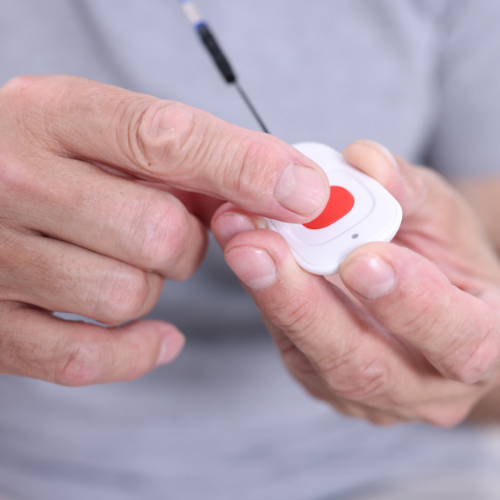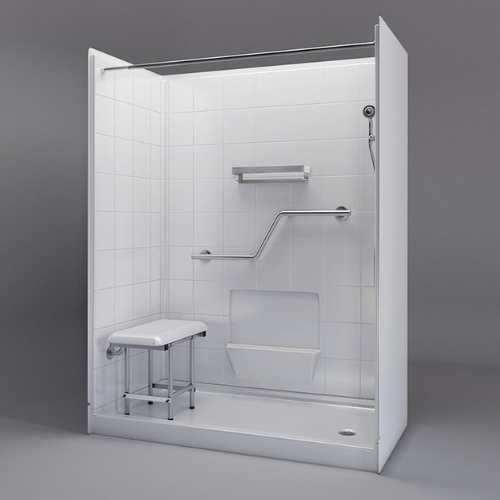As our loved ones age, safety becomes a top priority. One of the most effective tools to ensure peace of mind is a life alert system — a device that provides instant help in case of emergencies like falls, sudden illness, or home accidents. But many seniors or caregivers ask a common question: “Are there free life alert systems for seniors?”
In this guide, we explore realistic free and low-cost options available, including community programs, devices with no monthly fees, and smart alternatives — all while following the latest guidelines from trusted sources and affiliate policies.

What Is a Life Alert System?
A life alert system, also known as a personal emergency response system (PERS), is a safety device designed to help seniors, people with disabilities, or individuals with medical conditions quickly get help during an emergency, especially when they’re alone.
These systems typically consist of two main components:
- A wearable device — usually a necklace, pendant, or wristband — that includes a button the user can press in case of an emergency.
- A base unit — placed in the home and connected to a landline or cellular network to facilitate two-way communication with a response center or emergency contacts.
Some advanced systems also include:
- Fall detection technology automatically alerts emergency responders if a fall is detected.
- GPS tracking, useful for seniors who are active outside the home.
- Mobile life alert devices, which work anywhere with cellular service.
When the user presses the emergency button, the device either:
- Connects directly to a trained professional at a 24/7 monitoring center, or
- Calls or texts pre-set emergency contacts (like family members, neighbors, or caregivers).

Why Do Seniors Need Life Alert Systems?
As people age, the risk of falls and medical emergencies increases significantly. According to the CDC, 1 out of 4 seniors in the U.S. experiences a fall every year, and many of these result in hospitalization or long-term injury. In such moments, immediate assistance can make a life-saving difference.
Life alert systems give:
- Peace of mind to family and caregivers
- Confidence and independence to seniors
- Faster emergency response time
They’re especially vital for:
- Seniors who live alone
- Elderly individuals with heart conditions, diabetes, or mobility issues
- People recovering from surgery or living with chronic illness

Key Benefits of Life Alert Systems:
- 24/7 emergency support
- Faster medical response
- Improved sense of safety and freedom
- Simple and easy to use for seniors
- Helps prevent worse outcomes from accidents
These systems can be subscription-based, requiring monthly fees, or one-time-purchase devices that don’t include ongoing monitoring, which is why many seniors and caregivers are now searching for free life alert systems or those with no monthly fees. We’ll explore these options in the next section.
Are There Truly Free Life Alert Systems?
This is one of the most common — and important — questions asked by seniors and caregivers:
“Can I get a life alert system for free?”
The honest answer is:
✅ Yes, some options may be free or heavily subsidized, but they usually come with conditions such as income level, location, or medical need.
❌ However, fully-featured, brand-new life alert systems with no strings attached are rare.
Let’s explore the realistic ways seniors may get access to free or low-cost emergency alert systems, and how to avoid scams while doing so.

1. Government Assistance Programs
Several federal, state, and local government programs offer assistance to help seniors live safely and independently at home. While these programs may not always provide branded life alert systems, they often cover medical alert devices or similar safety equipment through certain criteria.
Here are some key programs to consider:
- Medicaid Waiver Programs:
In some U.S. states, Medicaid offers Home and Community-Based Services (HCBS) waivers that may pay for personal emergency response systems. These waivers are designed to help seniors remain in their homes rather than move to nursing facilities. - Area Agencies on Aging (AAA):
Your local AAA office can connect you with non-profit organizations, state-funded services, or senior support programs that offer free or discounted safety alert systems. - Veterans Assistance (VA):
If the senior is a U.S. military veteran, the Department of Veterans Affairs may offer a free medical alert system through certain VA healthcare plans or disability benefits.
Pro Tip: Contact your state’s Medicaid office or Area Agency on Aging to check eligibility for these services.

2.Non-Profit Organizations and Senior Charities
Many seniors receive help from charitable organizations and faith-based groups that focus on elderly care. These nonprofits often partner with device manufacturers or healthcare agencies to provide donated or refurbished Life Alert systems to seniors in financial need.
Organizations to explore:
- Lions Clubs International
- Catholic Charities
- Local senior centers or church outreach programs
- Meals on Wheels programs that sometimes include wellness checks and emergency tools
These programs vary by region and may require an application or proof of income.
3. Free or Low-Cost Mobile Alert Apps
While not traditional life alert devices, there are mobile apps that offer emergency features, many at no cost:
- Red Panic Button
- Snug Safety
- Life360
- CarePredict (limited free features)

4. Free Trial Offers from Alert Companies
These apps allow seniors to send alerts to family or caregivers at the touch of a button. Some also offer location tracking, daily check-ins, and automatic fall alerts (in premium versions).
Seniors who already use smartphones can benefit from these cost-effective digital solutions.
Some reputable medical alert providers offer limited-time free trials, often ranging from 7 to 30 days. These trials can help seniors test the product before committing to a monthly plan. While these systems are not permanently free, they’re useful for short-term needs or evaluating quality.
Always check:
- Terms and conditions
- Cancellation policies
- Whether return shipping is free
Be cautious of systems that ask for credit card details without a clear cancellation process.
Know the Limitations
While there are options to get free or nearly-free alert systems, it’s important to understand:
- Free systems may be basic in features.
- Some require you to qualify based on age, income, or disability.
- Most programs are location-specific, and availability can vary widely.
Still, if you or a loved one is in need, it’s worth exploring these options first before investing in a paid system. In many cases, low-cost alternatives with no monthly fees may offer similar peace of mind for a one-time price, and we’ll cover those next.
Would you like me to continue expanding the next section (like No-Monthly-Fee Devices) or create a downloadable resource/guide for your readers to find free programs in their area?

Choosing the Right Life Alert System
When selecting a device or solution, consider these factors:
- ✅ Ease of Use: Big buttons, clear voice commands, and simple setup.
- ✅ Reliability: Does it work during power outages? Is it waterproof?
- ✅ Coverage: Does it work indoors and outdoors (with GPS)?
- ✅ No Hidden Fees: Check for any activation, cancellation, or maintenance fees.
Final Thoughts
While free life alert systems may be limited, seniors today have access to a wide range of affordable safety solutions that support independence and peace of mind. From community-based assistance programs to smart emergency tools with no monthly fees, the available choices are growing rapidly.
Emergency preparedness also goes hand in hand with daily mobility and fall prevention. If you or a loved one is exploring ways to move more confidently, our in-depth look at some of the most trusted walking aids could be a helpful next step — discover the top options here.
As our site continues to grow, we’ll keep sharing reliable, senior-friendly products — always tested, reviewed, and aligned with best practices and affiliate compliance.



